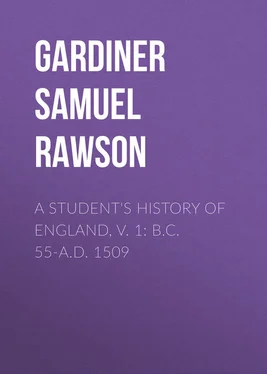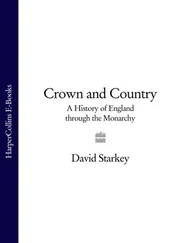Samuel Gardiner - A Student's History of England, v. 1 - B.C. 55-A.D. 1509
Здесь есть возможность читать онлайн «Samuel Gardiner - A Student's History of England, v. 1 - B.C. 55-A.D. 1509» — ознакомительный отрывок электронной книги совершенно бесплатно, а после прочтения отрывка купить полную версию. В некоторых случаях можно слушать аудио, скачать через торрент в формате fb2 и присутствует краткое содержание. Издательство: Иностранный паблик, Жанр: foreign_prose, История, foreign_antique, на английском языке. Описание произведения, (предисловие) а так же отзывы посетителей доступны на портале библиотеки ЛибКат.
- Название:A Student's History of England, v. 1: B.C. 55-A.D. 1509
- Автор:
- Издательство:Иностранный паблик
- Жанр:
- Год:неизвестен
- ISBN:нет данных
- Рейтинг книги:5 / 5. Голосов: 1
-
Избранное:Добавить в избранное
- Отзывы:
-
Ваша оценка:
- 100
- 1
- 2
- 3
- 4
- 5
A Student's History of England, v. 1: B.C. 55-A.D. 1509: краткое содержание, описание и аннотация
Предлагаем к чтению аннотацию, описание, краткое содержание или предисловие (зависит от того, что написал сам автор книги «A Student's History of England, v. 1: B.C. 55-A.D. 1509»). Если вы не нашли необходимую информацию о книге — напишите в комментариях, мы постараемся отыскать её.
A Student's History of England, v. 1: B.C. 55-A.D. 1509 — читать онлайн ознакомительный отрывок
Ниже представлен текст книги, разбитый по страницам. Система сохранения места последней прочитанной страницы, позволяет с удобством читать онлайн бесплатно книгу «A Student's History of England, v. 1: B.C. 55-A.D. 1509», без необходимости каждый раз заново искать на чём Вы остановились. Поставьте закладку, и сможете в любой момент перейти на страницу, на которой закончили чтение.
Интервал:
Закладка:
CHAPTER II.
THE ENGLISH SETTLEMENTS
Landing of the Jutes in Thanet A.D. 449?
The West Saxons defeated at Mount Badon 520
The West Saxons take Sorbiodunum 552
Battle of Deorham 577
The West Saxons defeated at Faddiley 584
1. Britain after the Departure of the Romans. 410—449?—After the departure of the Romans, the Picts from the north and the Scots from Ireland continued their ravages, but though they caused terrible misery by slaughtering or dragging into slavery the inhabitants of many parts of the country, they did not succeed in making any permanent conquests. The Britons were not without a government and an armed force; and their later history shows that they were capable of carrying on war for a long time against enemies more formidable than the Picts and Scots. Their rulers were known by the British title Gwledig, and probably held power in different parts of the island as the successors of the Roman Duke of the Britains and of the Roman Count of the Saxon Shore. Their power of resistance to the Picts and the Scots was, however, weakened by the impossibility of turning their undivided attention to these marauders, as at the same time that they had, to defend the Roman Wall and the western coast against the Picts and Scots, they were exposed on the eastern coast to the attacks of the Saxon pirates.
2. The Groans of the Britons.—In their misery the thoughts of the Britons turned to those Roman legions who had defended their fathers so well. In 446they appealed to Aëtius, the commander of the Roman armies, to deliver them from their destroyers. "The groans of the Britons" was the title which they gave to their appeal to him. "The barbarians," they wrote, "drive us to the sea; the sea drives us back to the barbarians; between them we are exposed to two sorts of death: we are either slain or drowned." Aëtius had no men to spare, and he sent no help to the Britons. Before long the whole of Western Europe was overrun by barbarian tribes, the title of Emperor being retained only by the Roman Emperor who ruled from Constantinople over the East, his authority over the barbarians of the West being no more than nominal.
3. The Conquest of Kent. 449?—It had been the custom of the Roman Empire to employ barbarians as soldiers in their armies, and Vortigern, the British ruler, now followed that bad example. In or about 449a band of Jutish sea-rovers landed at Ebbsfleet, in the Isle of Thanet. According to tradition their leaders were Hengist and Horsa, names signifying the horse and the mare, which were not very likely to have been borne by real warriors. Whatever may have been the names of the chiefs, Vortigern took them into his service against the Picts, giving them the Isle of Thanet as a dwelling-place for themselves. With their help he defeated the Picts, but afterwards found himself unable to defend himself against his fierce auxiliaries. Thanet was still cut off from the mainland by an arm of the sea, and the Jutes were strong enough to hold it against all assailants. Their numbers rapidly increased as shiploads of their fellows landed, and they crossed the strait to win fresh lands from the Britons on the mainland of Kent. In several battles Vortigern was overpowered. His rival and successor, Ambrosius Aurelianus, whose name makes it probable that he was an upholder of the old Roman discipline, drove back the Jutes in turn. He did not long keep the upper hand, and in 465he was routed utterly. The defeat of the British army was followed by an attack upon the great fortresses which had been erected along the Saxon Shore in the Roman times. The Jutes had no means of carrying them by assault, but they starved them out one by one, and some twenty-three years after their first landing, the whole of the coast of Kent was in their hands.
4. The South Saxons. 477.—The conquests of the Jutes stopped at the inlet of the sea now filled by Romney Marsh. To the south and west was the impenetrable Andred's Wood, which covered what is now known as the Weald. At its eastern extremity stood by the sea the strong fortified town of Anderida, which gave its name to the wood, the most westerly of the fortresses of the Saxon Shore still unconquered by the Jutes. It was at last endangered by a fresh pirate band—not of Jutes but of Saxons—which landed near Selsey, and fought its way eastwards, conquering the South Downs and the flat land between the South Downs and the sea, till it reached Anderida. Anderida was starved out after a long blockade, and the Saxons, bursting in, 'slew all that dwelt therein, nor was there henceforth one Briton left.' To this day the Roman walls of Anderida stand round the site of the desolated city near the modern Pevensey. Its Saxon conquerors came to be known as the South Saxons, and their land as Sussex.
5. The West Saxons and the East Saxons.—Another swarm also of Saxons, called Gewissas, landed on the shore of Southampton Water. After a time they were reinforced by a body of Jutes, and though the Jutes formed settlements of their own in the Isle of Wight and on the mainland, the difference of race and language between them and the Gewissas was not enough to prevent the two tribes from coalescing. Ultimately Gewissas and Jutes became known as West Saxons, and established themselves in a district roughly corresponding with the modern Hampshire. Then, having attempted to penetrate further west, they were defeated at Mount Badon, probably Badbury Rings in Dorsetshire. Their overthrow was so complete as to check their advance for more than thirty years. Whilst the coast line from the inlet of the sea now filled by Romney Marsh to the western edge of Hampshire had thus been mastered by Saxons, others of the same stock, known as East Saxons, seized upon the low coast to the north of the Thames. From them the land was called Essex. Neither Saxons nor Jutes, however, were as yet able to penetrate far up the valley of the Thames, as the Roman settlement of London, surrounded by marshes, still blocked the way.
6. The Anglian Settlements.—The coast-line to the north of the East Saxons was seized at some unascertained dates by different groups of Angles. The land between the Stour and the great fen which in those days stretched far inland from the Wash was occupied by two of these groups, known as the North folk and the South folk. They gave their names to Norfolk and Suffolk, and at some later time combined under the name of East Anglians. North of the Wash were the Lindiswara—that is to say, the settlers about the Roman Lindum, the modern Lincoln, and beyond them, stretching to the Humber, were the Gainas, from whom is derived the name of the modern Gainsborough. To the north of the Humber the coast was fringed by Angle settlements which had not yet coalesced into one.
7. Nature of the Conquest.—The three peoples who effected this conquest were afterwards known amongst themselves by the common name of English, a name which was originally equivalent to Angle, whilst amongst the whole of the remaining Celtic population they were only known as Saxons. The mode in which the English treated the Britons was very different from that of the Romans, who were a civilised people and aimed at governing a conquered race. The new-comers drove out the Britons in order to find homes for themselves, and they preferred to settle in the country rather than in a town. No Englishman had ever lived in a town in his German home, or was able to appreciate the advantages of the commerce and manufacture by which towns are supported. Nor were they inclined to allow the inhabitants of the Roman towns to remain unmolested in their midst. When Anderida was captured not a Briton escaped alive, and there is good reason to believe that many of the other towns fared no better, especially as the remains of some of them still show marks of the fire by which they were consumed. What took place in the country cannot be certainly known. Many of the British were no doubt killed. Many took refuge in fens or woods, or fled to those portions of the island in which their countrymen were still independent. It is difficult to decide to what extent the men who remained behind were spared, but it is impossible to doubt that a considerable number of women were preserved from slaughter. The conquerors, at their landing, must have been for the most part young men, and when they wanted wives, it would be far easier for them to seize the daughters of slain Britons than to fetch women from the banks of the Elbe.
Читать дальшеИнтервал:
Закладка:
Похожие книги на «A Student's History of England, v. 1: B.C. 55-A.D. 1509»
Представляем Вашему вниманию похожие книги на «A Student's History of England, v. 1: B.C. 55-A.D. 1509» списком для выбора. Мы отобрали схожую по названию и смыслу литературу в надежде предоставить читателям больше вариантов отыскать новые, интересные, ещё непрочитанные произведения.
Обсуждение, отзывы о книге «A Student's History of England, v. 1: B.C. 55-A.D. 1509» и просто собственные мнения читателей. Оставьте ваши комментарии, напишите, что Вы думаете о произведении, его смысле или главных героях. Укажите что конкретно понравилось, а что нет, и почему Вы так считаете.












